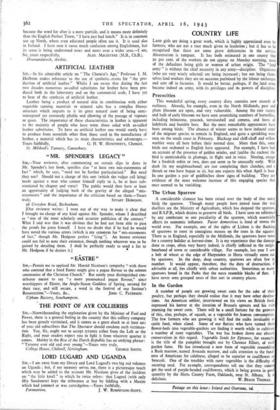COUNTRY LIFE
LAND girls are doing a great work, which is highly appreciated even by farmers, who are not a race much given to laudation ; but it has to be recognised that there are some grave deficiencies in the service. Absenteeism is rampant. It has been estimated in one county that 20 per cent. of the workers do not appear on Monday morning, most of the defaulters being girls or women of urban origin. The "land army " is without the chief necessity in any army—discipline. Organisers (who are very wisely selected) are being increased ; but not being them- selves land workers they are on occasion purloined by the labour exchanges and sent off to factories. It would be better, perhaps, if the land army became indeed an army, with its privileges and its powers or discipline.
Precocities This wonderful spring, every country diary contains new records of earliness. Already, for example, even in the North Midlands, pear and plum blossom are open, and very vulnerable. Among the rare variety and bulk of early blossom we have seen astonishing numbers of butterflies, including brimstone, peacock, tortoiseshell and comma, and hosts of ladybirds and bumble bees. But the most remarkable appearances have been among birds. The absence of winter seems to have induced some of the migrant species to remain in England, and quite a sprinkling were seen on the south coast in February. Blackcap and chiff-chaff and willow warbler were all here before their normal date. More than this, some birds not reckoned as English have appeared. For example, I have had an. account of the presence of golden orioles, and (unlike the cuckoo) the bird is unmistakable in plumage, in flight and in voice. Nesting, except for a freakish robin or two, does not seem to be unusually early. Wild duck (in my neighbourhood) are just completing their clutches, and a thrush or two have begun to sit, but one expects this when April is here. In one garden a pair of goldfinches show signs of building. They are evidence of the most welcome increase of this engaging species that once seemed to be vanishing.
The Urban Sparrow A considerable clamour has been raised over the body of that noisy bird, the sparrow. Though many people have joined issue the real duellists are the Ministry of- Agriculture, which has damned the sparrow, and R.S.P.B., which desires to preserve all birds. I have seen no reference by any combatant to one peculiarity of the sparrow, which essentially affects its economic influence. Passer domesticus is fond of towns the world over. For example, one of the sights of Lisbon is the flocking of sparrows to roost in contagious masses on the trees in the squares. There as in England, especially in the Midlands, the sparrows leave town for a country holiday at harvest-time. It is my experience that the damage done to crops, often very heavy indeed, is chiefly inflicted in the neigh- bourhood of town or considerable village. For example, last year I saw a belt of wheat at the edge of Harpenden in Hens virtually eaten out by sparrows-. In the deep, deep country, sparrows are often few in number. It would appear, therefore, that the duty of destruction, if advisable at all, lies chiefly with urban authorities. Sometimes so many sparrows breed in the Parks that the nests resemble blocks of flats. I have never seen grouped nests of that sort in country places.
In the Garden A number of people are growing sweet corn for the sake of their poultry, but perhaps they should realise that it may have other destina- tions. An American soldier, interviewed on his views on British food, expressed his horror at the iteration of Brussels sprouts and his vain yearning for sweet corn. There will be a small fortune for the growers of this, also, perhaps, of squash, as a vegetable for .human consumption. The few farmers who are growing it will find the stalks invaluable as cattle food, when shoed. Some of our florists who have turned their flower-beds into vegetable-gardens are finding it worth while to cultivate a number of rarer vegetables. The war has broken down our absurd conservatism in this regard. Vegetable Seeds for Epicures„ for example. is the title of the pamphlet brought out by Clarence Elliott, of rock garden fame. He has introduced a new form of vegetable resembling a Bush marrow, named Avocada marrow, and calls attention to the fond- ness of Americans for calabrese, alleged to be superior to cauliflower or broccoli. One of the troubles with rarer vegetables is the difficulty of securing seed. For example, correspondents tell me that they cannot get the seed of purple-headed cauliflowers, which is being grown in good quantity by the Hens County Farm, Oaklands, near St. Albans: It is Postage on this issue : Inland and Overseas, td.


























 Previous page
Previous page